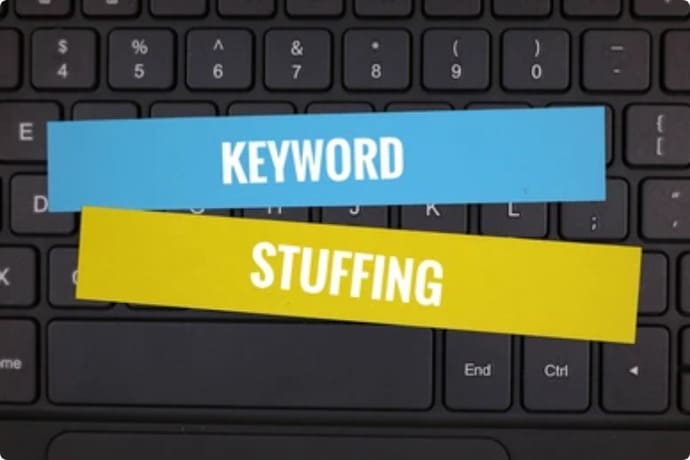What Is Keyword Stuffing And Why To Avoid It

Why Keyword Stuffing is a Red Flag for Google and Other Search Engines
Welcome by this article about What is keyword stuffing, where you’ll find out what it is, and what to do instead.
Are you guilty of stuffing your website with keywords in hopes of boosting your search engine rankings? It may seem like a quick and easy solution, but beware – Google and other search engines are onto this sneaky tactic.
Keyword stuffing can actually harm your SEO efforts by flagging your content as spammy, resulting in lower rankings or even penalties.
In this blog post, we’ll have a look at the reasons why keyword stuffing is a red flag for search engines. You’ll also learn what you should do instead to improve your SEO strategy.
Click here to see my #1 recommendation for making money online
Introduction to What Is Keyword Stuffing
Keyword stuffing is a black hat SEO tactic that involves cramming a target keyword or phrase into a piece of content as many times as possible in an attempt to improve search engine rankings.
This practice is considered to be manipulative and deceitful by search engines, and can result in penalties or even getting banned from the SERPs altogether.
While it may have worked in the past, keyword stuffing is now a major red flag for Google and other search engines.
If you’re caught doing it, you could see your website’s traffic drop significantly overnight. Worse yet, your site could be removed from the search results entirely.
So, what is keyword stuffing exactly? Here are a few examples:
– Repeating the same keyword or phrase over and over again: “Buy cheap shoes online! Cheap shoes for sale! Get your cheap shoes here!”
– Including keywords in unnatural places: “Our company provides quality services (keyword) that will exceed your expectations.”
– Stuffing keywords into alt tags: “This image shows a beautiful landscape (keyword).”
If you’re guilty of any of these practices, it’s time to stop. Not only will you avoid getting penalized by Google, but you’ll also start to see better results from your SEO efforts overall.
How Does Google Identify Keyword Stuffing?
Google and other search engines use a variety of methods to identify keyword stuffing.
This includes looking at the density of keywords on a page, the prominence of keywords in the title and in the body of the text. The keywords should also be used in a natural way.
One surefire way to get penalized for keyword stuffing is to repeat the same keyword over and over again in an attempt to game the system.
This not only looks unnatural, but it also makes for a terrible user experience. Not only will users be turned off by the incessant repetition, but search engines will pick up on it as well.
Another way that Google can tell if you’re stuffing keywords is by looking at how prominent they are on the page. If your keywords are only appearing in the body text and are buried among other words, that’s a red flag.
On the other hand, if your keywords are appearing in key places like the title, headings, and meta tags, that’s a good sign that you’re using them effectively.
Finally, Google looks at whether keywords are being used in a natural way.
If you’re cramming them into your content without regard for how they actually fit, that’s going to look suspicious to Google.
That is what is keyword stuffing about. So those are some of the ways that Google can tell if you’re stuffing keywords.
Remember, keyword stuffing is a major red flag and can lead to penalties from Google, and even removing your website from the search engine result pages.
If you’re using keywords naturally and strategically throughout your content, that’s going to look much better.
Why Is Over-Using Keywords Problematic for SEO?
When it comes to SEO, quality is always better than quantity. This is why keyword stuffing is such a problem for search engine optimization.
Not only does it make your content less readable, but it also tells search engines that you’re trying to game the system by cramming in as many keywords as possible.
This can result in lower search engine rankings or even getting banned from the search engines entirely. That is what is keyword stuffing all about.
There are a few reasons why keyword stuffing is problematic for SEO:
1. It’s unnatural and difficult to read.
If you stuff your content full of keywords, it’s going to be very difficult to read. Not only will it be hard to follow, but it will also come across as being unnatural and forced.
This is a major turn-off for readers, and it will ultimately hurt your chances of ranking well in the search engines.
2. It looks spammy and manipulative.
Keyword stuffing looks bad to both humans and search engines. It makes your content look like nothing more than a bunch of keywords thrown together, which comes across as being spammy and manipulative.
This can damage your reputation and cause people to trust you less. In turn, this can lead to lower rankings in the search engines.
3. It can get you penalized by Google and other search engines.
One of the biggest dangers of keyword stuffing is that it can get you penalized by Google and other search engines.
If the search engine notices that you’re using excessive keywords, they may lower your rankings or even ban you completely. To avoid this, it’s important to use keywords naturally and in moderation.

Click here to see my #1 recommendation for making money online
What Are the Consequences of Keyword Stuffing?
When it comes to SEO, there is a lot of talk about keywords. What are they? Why are keywords so important?
Keyword stuffing is the act of cramming as many keywords into your website’s content as possible, in an attempt to artificially inflate your site’s SERP ranking.
It’s considered a black hat SEO tactic and is looked down upon by search engines. In fact, if you do it, you could be penalized by Google and other search engines.
So what are the consequences of keyword stuffing? Here are a few:
Your Content May Be Labeled as Spam – If you stuff too many keywords into your content, search engines may label it as spam.
This means that your content will be less likely to show up in SERPs, and if it does show up, it will be buried under a mountain of other results.
You Could Be Penalized by Search Engines – As we mentioned above, if you do it, you could be penalized by Google and other search engines.
This means that your website could be removed from SERPs entirely or relegated to the very bottom of the results page. Not good!
Your Website May Lose Traffic – If your website is penalized by search engines or labeled as spam, this means your site will lose traffic.
After all, if people can’t find your website in the search engine result pages (SERPs), they won’t be able to visit it. This could have a huge impact on your website’s success.
Your Reputation May Be Damaged – Keyword stuffing could have a negative effect on your reputation. People may be less likely to share your website or link to it.
In short, keyword stuffing can have serious consequences for your website’s ranking in SERPs and its reputation. Avoid keyword stuffing at all costs!
Alternative Strategies to Optimize for SEO
Now that you know What is keyword stuffing, how can you use keywords to improve your website’s ranking, in the search engine results pages (SERPs)?
There are a number of alternative strategies you can employ to optimize your content for SEO. Here are a few to consider:
1. Use keyword-rich titles and descriptions.
Make sure your title and description tags are keyword rich and relevant to the content on your page. This will help your pages rank higher in search engine results pages (SERPs).
2. Structure your content using headlines and subheadings.
Breaking your content up into smaller, digestible chunks makes it easier for readers to consume. It will also help to improve your SEO. Using headlines and subheadings is a great way to do this.
3. Incorporate keywords naturally into your content.
Using keywords throughout your content in a natural way will not only help with SEO but also give better readability. Over-stuffing keywords, on the other hand, will turn off readers and could result in search engine penalties.
4. Optimize images for SEO.
Make sure to include relevant keywords in image file names and alt text so that search engines can index them properly. This will help improve your overall website ranking as well as individual image ranking in SERPs.
5 Utilize social media platforms for SEO purposes.
Promote and share blog posts through social media channels. Facebook, Twitter and Instagram can help you gain more visibility and drive more traffic to your website.
6. Optimize for local search.
If you’re a local business, make sure to include your city and state in title tags and meta descriptions, as well as in the content on your website. This will help to show up for local searches related to your business.
Click here to see my #1 recommendation for making money online
Conclusion
We hope this article about What is keyword stuffing has provided you with a better understanding of why keyword stuffing is considered a red flag for search engines.
Keyword stuffing makes your content appear spammy and can potentially be damaging to both your website’s ranking and user experience.
Instead, focus on writing quality content that uses the keywords naturally and strategically. This will ensure that you are providing value while still optimizing your pages to rank higher in search engine results.

